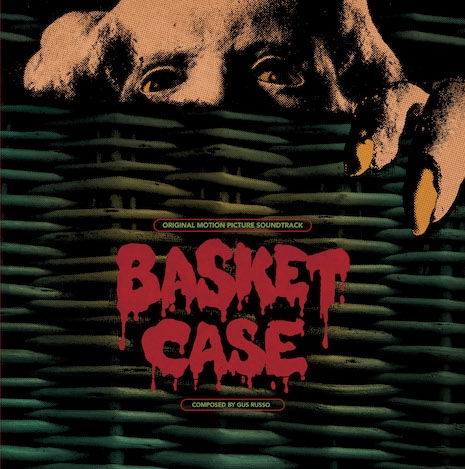
“The sickest movie I’ve ever seen!”—Rex Reed
Basket Case is an ultra-gory low-budget horror comedy. Written and directed by indie filmmaker Frank Henenlotter, this 1982 motion picture concerns a young man, Duane, who’s seeking revenge for the forced surgery that separated him from his Siamese twin brother, Belial, who’s disfigured—so much so, that Duane carts Belial around in a basket. Effectively mixing humor and over-the-top gore on a minuscule budget, the film earned a cult following and spawned two sequels.
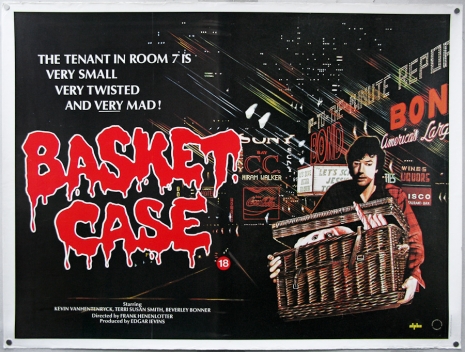
Gus Russo is responsible for the solid Basket Case score. Russo’s spooky (and often altogether hair-raising) synth work alternates with bossa nova tracks, and pieces driven by various instruments—usually sax or vibes. It’s quite an accomplishment, considering how little Russo had to work with AND that it was his first attempt at scoring a film (more on all of that in a moment).
On January 20th, the Terror Vision record and video label will put out the score for Basket Case, and we’ve got an exclusive audio preview. But first up is a Dangerous Minds interview with Gus Russo, who tells us how serendipity played a role in both the score coming together and its eventual, impending release.
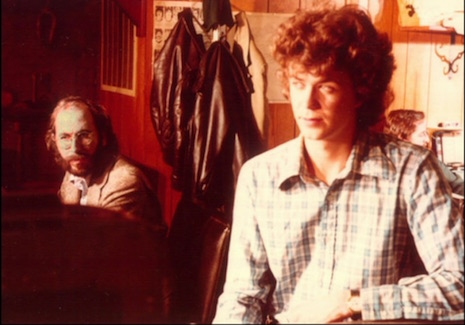
Gus Russo (on the left) in a scene cut from ‘Basket Case.’
How did you get the job scoring Basket Case?
Gus Russo: I was gigging in Upstate New York, and some of the regulars who used to come to this one club— they were just the rowdiest bunch of people, in a good way. One night, we—the band—introduced ourselves and said, “Who are you guys anyway?” And they said, “Well, we’re from the Glens Falls Hospital’s psychiatric unit.” So, we thought they were people on some sort of relief program—turns out they were the doctors and the technicians (laughs). They just really knew how to party. One of them was Edgar Ievins. He ended up being the producer of Basket Case.
Edgar and I became friends because he was a violinist, and he would sit in and play violin with us. Then Edgar disappeared from Upstate New York, and about a year or so later I heard from him, and he said, “I’m doing movies now in New York City, wanna write the score for the first one?” That’s how it got going.
But I met him at a gig. After work, he would come and sit-in on violin with my band. Then he moved and got involved somehow with Frank [Frank Henenlotter] in New York City.
What was your process like for scoring Basket Case?
Gus Russo: We had no money, even though Edgar went around and raised some money, it really all went to film stock. I had just a few dollars. Once I got the gig, I went down to New York City, from upstate, and met with Frank and watched some rushes of what he had filmed. He gave me the script, and then we talked about styles he wanted. He wanted a variety of music for different scenes.
I have an acoustic guitar back upstate, an electric Gibson, and a four-track tape deck. So, I go back up there and say to myself, ‘How can I create Bernard Herrmann music’—which is what Frank really likes—‘with no money.’ So, I just did the best I could. He wanted a theme that repeated throughout the movie in different styles, like Bernard Herrmann would do, so I came up with that theme. When he had the doctor’s office scene—we couldn’t even afford to buy generic bossa nova background music—so I had to write elevator music for the doctor scenes.
It was all done in my living room on a four-track tape deck. All live, no digital, no nothing.
Did you play all of the instruments?
Gus Russo: I didn’t play them all, but I had friends come by and play. I played a lot of synthesizer. I used the ARP String Ensemble to play fake violins. I went around to my friends and said, “What can I borrow from everybody, because we’ve got no money?” One guy said, “I have a timpani.” Another guy said, “I’ve got vibes.” I had an Echoplex tape machine, which is basically an analog tape loop that we used to use to make tape echo. That played a big part in it, because that was one of the main tools that we had. So, you had this bizarre menagerie of things in my living room—an upright piano that was out of tune, an Echoplex, a timpani drum, a set of vibes, and friends that would come by and play a part. So, it was really wild.
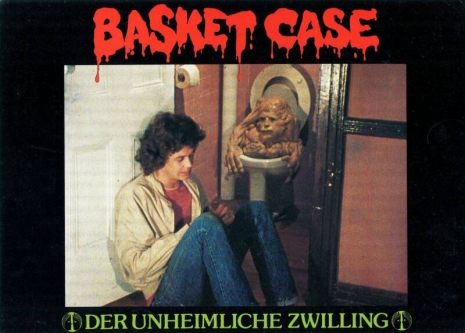
German lobby card.
How did your deal with Terror Vision to release the recordings come about?
Gus Russo: There was a company that called me about a year, maybe two years ago, that wanted to do the score. We talked for months and it looked like it was done deal, and then it cratered. They never even got back to me. I was bemoaning that to a friend here in Baltimore, who is into the cult movie thing, and he said, “I got just the guy for you, who would love to do it.” He introduced me to Ryan [Ryan Graveface, Terror Vision’s majordomo], and, as I told him, being a pack rat I save everything. I had all of the original tapes. Ryan asked, “Oh my god, how do they sound?” And I said, “I haven’t opened them in 30 years or more.” So he said, “If you get those tapes in the studio, and can remix those four tracks, off of original tapes, and they sound good, I’ll pay for it all.” It was really great of him.
I went to a studio in Maryland and we spent two weeks doing it. We didn’t know if the tapes were going to play, because we thought the oxide would’ve fallen off by now. I was really worried, I didn’t know if the whole thing was going to happen at all, because I didn’t know about the tapes. Turns out, they sounded amazing—nothing had degraded. Apparently, I had stored them okay. Also, at the time, the one luxury I went for when I did the music was on noise reduction. So, what I did was, instead of using Dolby, which became the big deal, I found a better process called DBX, which really eliminates all of the noise without adding the bass effect, the muffling, and taking away of the brightness that Dolby does. That was the best investment I made. For $150 I bought a DBX machine to get rid of all the noise and make it sound like it was recorded at 30 inches per second—like we had spent a lot of money (laughs).
Luckily, I had not only saved the tapes, but the original DBX decoder. All these years, I had it in the garage. Had I not saved that, we couldn’t have played the tapes. It’s a two-pass thing: you code the tapes and then you have to play them back through that machine. We plugged the DBX in, put the tape on, and everything worked. We were stunned.
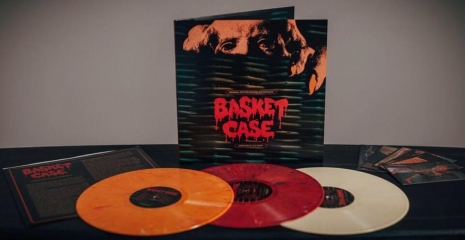
The score in the movie didn’t really get mixed in there very well, because we didn’t have the time or money to do it properly. That’s why I was so happy to get this out, because now you get to hear the way it sounded, finally.
There were a few years between Basket Case and Brain Damage (1988), the second film you scored for Frank Henenlotter—did you go back to being a working musician?
Gus Russo: Yeah, I was doing gigs, still. There was always going to be more movies, we were just waiting for the green light to do another one. They just rolled out Basket Case over a couple of years, because it played the midnight shows, at the Waverly [in New York City], and all around the country. They actually got a studio to give them a little more money for Brain Damage. So, we had a little bit of a budget—not much, but at least something. That’s why it looks a little better and sounds a little better. I was just doing my thing as a musician, and Edgar called and said, “We got the money! You ready for Brain Damage?” (laughs). So, we jumped on it, and that’s the way it went.
*****
Around the time of the release of Brain Damage, Russo changed his career path, from musician with a couple of film scores under his belt, to John F. Kennedy assassination investigator. He’s now a leading expert on the subject, having worked on documentaries for major TV networks and penning a number of books about the assassination. He’s also written about the Chicago mafia. Check out his Amazon page.
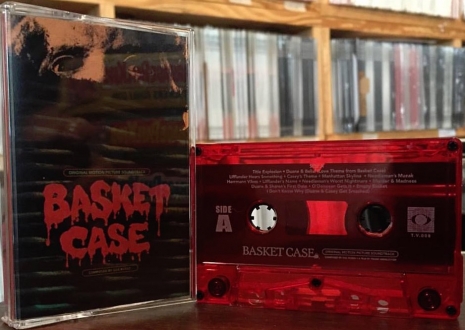
Pre-order the Basket Case score on LP or cassette (both formats include a digital download card) via Terror Vision’s website. They’ve even got a special pre-order bundle, which includes the score plus assorted goodies. You can also buy the LP on Amazon.
Later in the year, Terror Vision will also be putting out Gus Russo’s previously unissued Brain Damage score on vinyl, and both works will be included on a single CD. Follow Terror Vision on Facebook and stay in the loop.
Here’s the premiere of Gus Russo’s “End Credits” from Basket Case:
Terror Vision’s trailer (NSFW):
Previously on Dangerous Minds:
Farting monsters?!?: The ‘unconventional’ ‘80s occult horror stinker, ‘Spookies’